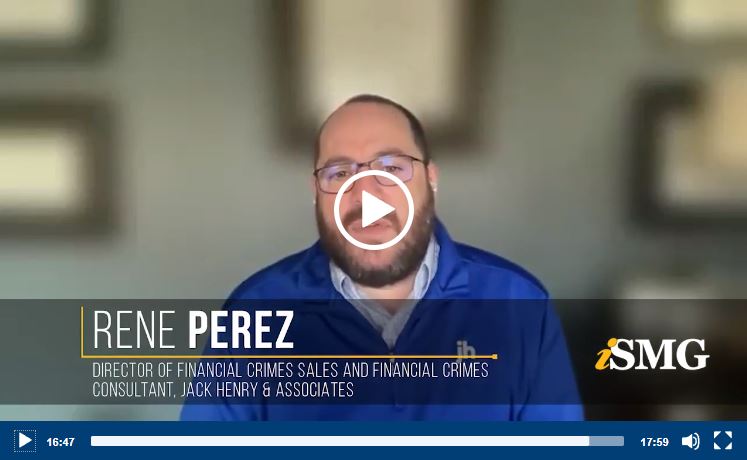Jack Henry & Associates Interview: Check Fraud Increased 180% Over 2022
- Check fraud continues to rise
- Scammers are now working with smaller dollar amounts
- The "Dark Web" provides an easly accessable marketplace for checks
At BankInfo Security, Suparna Goswami spent some time talking to Rene Perez, director of financial crimes sales and financial crimes consultant for Jack Henry & Associates, to review the major fraud scams we saw in 2023.

Click the image above to watch the video.
During the interview, Mr. Perez highlights three major fraud categories that "dominated" 2023:
- Check Fraud
- Scams directly targeting consumer for send funds to them
- Account Takeovers
Check Fraud Looms Larger
During the interview, Mr. Perez first addresses check fraud. He notes that check fraud is on top of everyone's minds, as it looks to be as high as 180% over last year.
An interesting point made by Ms. Goswani is that check fraud is leading to account takeovers. Mr. Perez points out that many banks continue to look at fraud in different payment silos, noting that banks are looking at channels like ACH, Zelle, deposits (which encompasses checks), but lack the ability to look at fraud hollistically -- which is a major issue for banks. This will enable fraudsters to keep exploiting banks in 2024 and beyond.

On the positive side, Mr. Perez notes more information sharing opportunities than ever before are now available, allowing a "combined intelligence" approach. This is similar to the multi-variant approach that we've covered in the past. Bringing multiple feeds into a single intelligence platform is the most effective path to tackle fraud as a whole, rather than each individual channel.
Fraudsters are Adapting
One of the ways in which fraudsters are adapting to new security options, Mr. Perez notes, is by working with smaller amounts per scam:
Historically, if criminals wanted to take over an account, they would target a customer's MFA token and use a payment channel to move the maximum amount possible, said Rene Perez, director of financial crimes sales and financial crimes consultant with Jack Henry & Associates.
"Most fraud systems now detect that large amount and block it every single time because that is not my normal pattern," Perez said. Fraudsters have switched to smaller transactions but a wider number of victims, he said.

Additionally, fraudsters are also deploying a new, patient approach that involves developing a "drop account," waiting 3 to 5 months to elapse after stealing a check or compromising an account to actually execute check fraud -- allowing the "dust to settle." This helps establish an account to execute fraudulent transactions -- avoiding detection from traditional transactional analysis.
Check Fraud Prediction for 2024
When predicting what will occur in 2024, Mr. Perez states, "I think check scams will continue to rise in 2024. We see on the Dark Web checks being traded left and right."
To meet this ongoing fraud challenge, Mr. Perez notes that banks will need a trusted partner, while also taking advantage of the newer cloud technologies to reinforce check security.
It's important that banks assess fintech partners on their track record/reputation, while also reviewing their technologies. While many new fintechs out there tout their tech as "innovative" and "state-of-the-art," they may lack the actual experience to be an effective partner.
Remember, check fraud detection is not new. Technology providers like OrboGraph not only possess vast experience in the field, but have been constantly evolving proprietary image forensic AI technologies to meet the needs of the industry.
